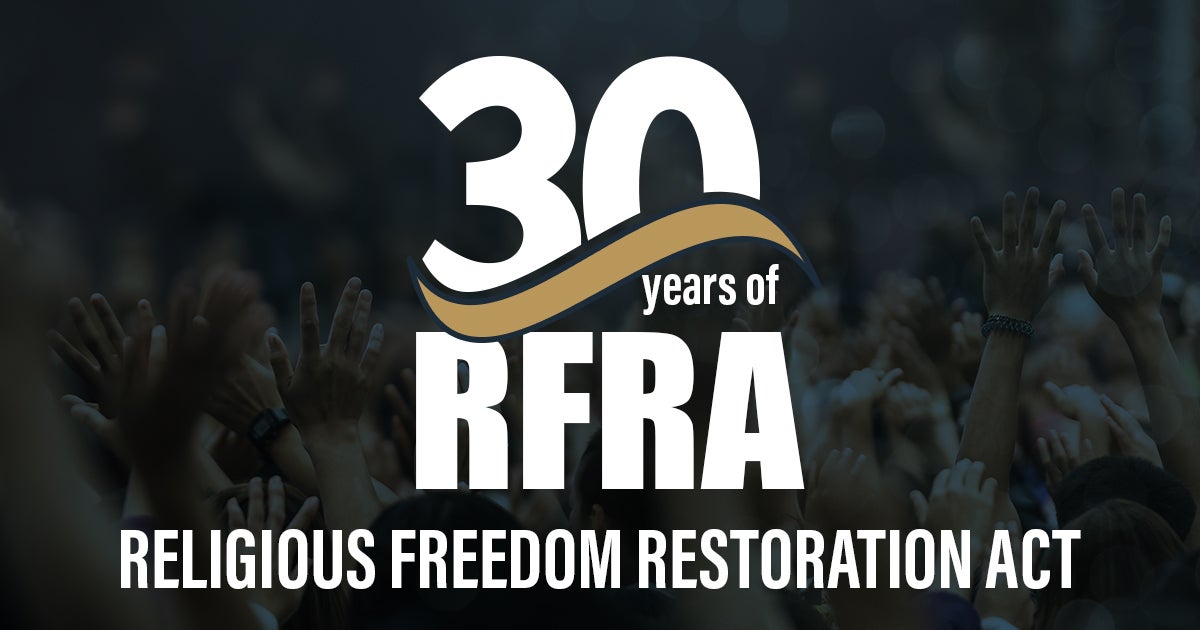
by Mia Gradick • 5 min read
November 16 is one of the most important days for religious liberty in America. This year, we celebrate the 30th anniversary of the passage of the Religious Freedom Restoration Act (RFRA).
This landmark federal law is crucial in protecting your right to live out your faith. The law says the federal government must accommodate religious practices when it can. It gives citizens their day in court when they believe the federal government has violated their rights.
Let’s take a brief look at its history and how it continues to be a bulwark for religious freedom.
RFRA’s History
In 1990, the Supreme Court handed down Employment Division v. Smith, which lowered the bar of scrutiny toward government infringement upon religious liberty. In short, that ruling was really damaging to the free exercise of religion.
After this harmful opinion, Rep. Stephen Solarz of New York introduced the first version of RFRA to restore protections under the Free Exercise Clause of the First Amendment. Then-Senator Joe Biden introduced a similar resolution in the Senate.
The bill went through committee, which revealed widespread support. During the 103rd Congress, then-Rep. Chuck Schumer reintroduced the bill with 170 co-sponsors. In a remarkable, bipartisan effort for religious freedom, the House passed the bill by a unanimous voice vote and the Senate supported it, 97-3. President Bill Clinton signed RFRA into law on November 16, 1993.
Watch the video below. First Liberty President and CEO Kelly Shackelford talks about RFRA’s legacy:
How Does it Protect Religious Freedom?
So, how does the law work and what does it actually protect?
The law states that “the [Federal] Government shall not burden a person’s exercise of religion even if the burden results from a rule of general applicability.” That burden must be necessary for the “furtherance of a compelling governmental interest” and must do so with “the least restrictive means.”
In other words, the federal government must accommodate people’s religious practices when able. Only in very rare cases is the federal government allowed to interfere with the right to freely live out one’s faith. And if it does, it must have a compelling reason and must do it in the least restrictive way possible. This sets a very high bar of legal scrutiny that the federal government must meet.
This federal law became so fundamental that states began adopting their own versions. At least 24 states have their own RFRAs with varying degrees of protection. Some states have looser and broader RFRAs, while others have statutes or even constitutional provisions that offer much stronger religious liberty safeguards.
Want to learn more about state RFRAs and whether your state has one? Take a look at the Religious Liberty in the States Index, published by First Liberty’s educational arm, the Center for Religion Culture and Democracy. You can learn more about it here.
The Importance of RFRA
RFRA is a bulwark when religious Americans have to fight in court for their rights. In many of the cases that First Liberty fights to restore religious liberty, RFRA is a staple of our legal defense.
For example, RFRA is central in defending our 35 U.S. Navy SEAL clients who faced career-ending threats and punishment for requesting a religious accommodation to the COVID-19 vaccine mandate. Throughout our briefs and arguments, we explained that the Biden administration violated RFRA by treating service members of faith more harshly than other service members and forcing them to violate their religious beliefs.
Mike Berry, First Liberty’s Director of Military Affairs, wrote an important piece in the Missouri Law Review about this. He detailed the long history of religious freedom and accommodation in the armed forces. The article explains that after many years of ignoring RFRA, the Department of Defense did eventually embrace RFRA when considering religious liberty issues, which was very positive for religious accommodation in the armed forces.
We also cite RFRA in our recent lawsuit for Space Force reservist Jace Yarbrough. Air Force officials punished Jace for a private speech he gave as a civilian at a private retirement ceremony. We filed a federal lawsuit and explained how the government is violating RFRA.
First Liberty frequently cites state RFRA’s when defending clients, such as:
In these cases—and in countless others—RFRA remains one of the most crucial protections for religious freedom. For 30 years, it has been a bedrock protection for people of all faiths to freely live out their beliefs. And three decades later, it remains as important as ever, especially with increasing attacks against religious Americans.
RFRA shows us that there are values and principles that unite our nation. Religious freedom is certainly one of them. Whether 30 years ago or 30 years in the future, the fact remains that religious liberty—America’s First Freedom—is timeless and should always be protected.